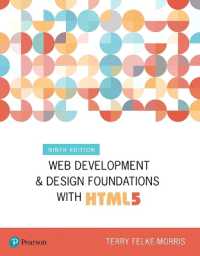- ホーム
- > 洋書
- > 英文書
- > Architecture
Full Description
Cities that promote inclusion not only ensure greater opportunities for their citizens but often reap large economic benefits. In recent years, smart cities have exploited and used technologies to guarantee a better quality of services and to predictively analyse and provide responses to urban changes in a proactive way. However, it has become clear that some initiatives have made existing inequalities stronger by failing to address the needs of all citizens. Today, more than ever, it is necessary to address inclusiveness in smart cities from the ground up. Sustainable solutions and energy efficient methods have led to cleaner energy, pollution reduction, improvements in the life of citizens, and transformed environments and regulatory structures to be more inclusive. This is creating smarter cities where citizens, inclusivity and sustainability are at the core.
Designing a new smart city is much simpler than incorporating new technologies into an already built urban space. This book covers technology advances, innovative concepts, solutions and applications in smart cities, both from engineering and social perspectives.
Smart Cities for Inclusive Innovation: Concepts, technologies and solutions is a useful resource for researchers and engineers in smart cities and their associated technologies as well as specialists such as planners, decision-makers and stakeholders in urban communities and local governments, and administrators involved in current and impending smart cities-related activities.
Contents
Chapter 1: Inclusive transformation: toward an ecosystem of social innovation
Chapter 2: Smart cities' key indicators
Chapter 3: Smart cities' development roadmap: case of the urban digital twin for the city of Berkane, Morocco
Chapter 4: Expansion and optimization of multi-carrier infrastructure in smart cities
Chapter 5: Smart sensors for smart environment
Chapter 6: Positive energy districts
Chapter 7: Wastes integration for increasing energy efficiency in smart cities
Chapter 8: Smart transport services in large urban cities
Chapter 9: Economic feasibility: key points analysis of smart cities projects
Chapter 10: Smart governance and e-public administration in smart cities
Chapter 11: Smart education
Chapter 12: Facing pandemics through smart cities
Chapter 13: Conclusion: future perspectives and new research directions








